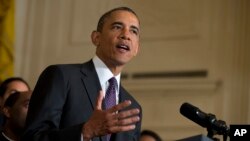The United States and Europe have opened negotiations on what could become the world's largest free trade zone, but the initial talks were overshadowed by reports of Washington's spying on its European allies.
The negotiations began Monday in Washington, with meetings scheduled throughout the week.
The U.S. and the combined 28-nation European Union are already the world's two largest economies. But with contentious issues on tariffs and other barriers to free trade dividing them, the periodic talks are likely to last for months. They are targeting the end of 2014 for completion of a deal.
The trade talks, announced last month, were almost derailed after former U.S. intelligence contractor Edward Snowden disclosed details of clandestine surveillance programs being conducted by the secretive National Security Agency, including Washington's spying on some European agencies and governments.
European officials voiced anger over the U.S. spying on its allies. President Barack Obama said that "every intelligence service, not just ours," spies on other nations "to understand the world better."
As the trade negotiations open, parallel talks are being held over the U.S. data collection and privacy issues, but not the NSA spying on allies.
The trade talks are likely to cover a wide array of products and industries. Europe would like to end the wide preference U.S. governmental agencies give to American contractors and suppliers, while the U.S. wants to open European markets to biotechnology products, including genetically modified foods that some Europeans consider dangerous.
The negotiations began Monday in Washington, with meetings scheduled throughout the week.
The U.S. and the combined 28-nation European Union are already the world's two largest economies. But with contentious issues on tariffs and other barriers to free trade dividing them, the periodic talks are likely to last for months. They are targeting the end of 2014 for completion of a deal.
The trade talks, announced last month, were almost derailed after former U.S. intelligence contractor Edward Snowden disclosed details of clandestine surveillance programs being conducted by the secretive National Security Agency, including Washington's spying on some European agencies and governments.
European officials voiced anger over the U.S. spying on its allies. President Barack Obama said that "every intelligence service, not just ours," spies on other nations "to understand the world better."
As the trade negotiations open, parallel talks are being held over the U.S. data collection and privacy issues, but not the NSA spying on allies.
The trade talks are likely to cover a wide array of products and industries. Europe would like to end the wide preference U.S. governmental agencies give to American contractors and suppliers, while the U.S. wants to open European markets to biotechnology products, including genetically modified foods that some Europeans consider dangerous.










